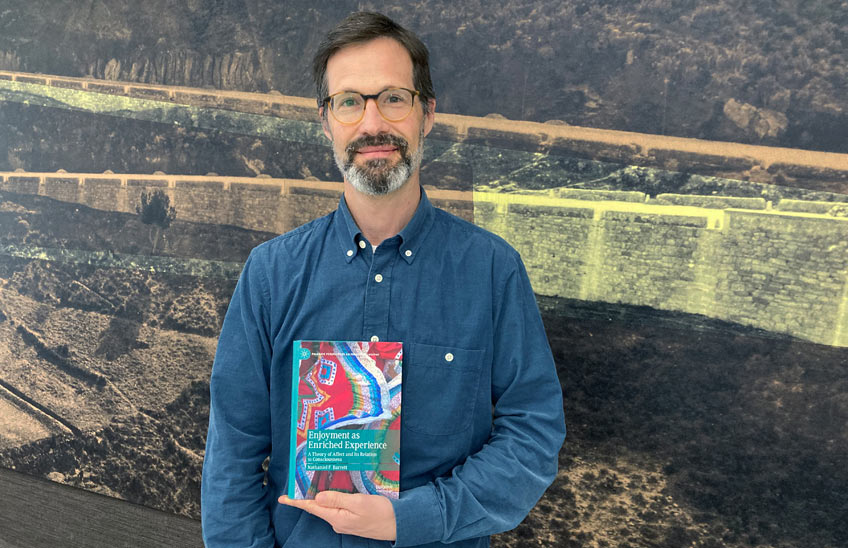Nathaniel Barrett, philosopher and researcher of the ICS: "Enjoyment is an enrichment of experience".
The researcher of group 'Mind-brain' has published a book in which he argues that the capacity to feel pleasure or pain is intrinsic to conscious experience.

FotoNatalia Rouzaut<br>/El investigador del ICS Nathaniel Barret con un ejemplar de su libro "Enjoyment as enriched experience. A theory of affect and its relation to consciousness".
09 | 04 | 2024
The philosopher Nathaniel Barrett, researcher of the group Mind-Brain of the Institute for Culture and Society (ICS), has recently published his book Enjoyment as enriched experience. A theory of affect and its relation to consciousness, edited by Palgrave Macmillan. In the book, he explores the challenge involved in understanding the experiences of pleasure and pain felt by any human being and proposes a "approach of enrichment": he argues that the capacity for enjoyment or suffering is intrinsic to conscious experience and that it entails, in each case, an enrichment or impoverishment of this.
To exemplify this, he proposes to think of an everyday event such as eating chocolate: "The question is to know what happens to the consciousness when we feel good or bad, what is the change. For example, when we overdo it with a food that we like a lot. If we are eating chocolate, but we overdo it, the level of pleasure goes down. And it may not only not be pleasurable anymore, but it may become something negative". He points out that "there is an affective change, from pleasure to disgust. I argue that pleasure is not an ingredient, something special that comes and goes. The change is always a subject enrichment or impoverishment of the experience that belongs to the whole". Neuroscientists usually understand pleasure or pain as an activation of a part of the brain. Barrett does not deny that the brain has mechanisms of affective regulation, but states that "we cannot understand the function of these mechanisms without knowing how affectivity pertains to consciousness."
The work emphasizes that in the arts we find a special enrichment of experience. Music was the starting point for research. Barrett, who plays the cello, recalls: "I found it very interesting to know why the enjoyment of music cannot be explained. I thought it was just a problem of music but, going deeper into topic, I discovered that all affectivity (pleasure, pain, enjoyment and suffering, feeling good or bad) is an unsolved problem". That mystery leads to ask some questions: what does it mean to feel good or bad? What is the dimension of pleasure or pain? What happens to the experience when we enjoy something?
One of the examples in the field of the arts is the worldwide success of the ballad Someone like you, which the British artist Adele released in 2011. This case leads to investigate the so-called "tragedy paradox": the public enjoys a song that connects with sadness, with heartbreak, to the point of being able to cry because of that emotion. The same happens with a theatrical drama or a movie. "We talk about the enjoyment of sadness, which in principle is a negative emotion. I defend that in music, and in the arts in general, we find an enriched sadness." And he distinguishes it from the sadness felt by a person going through a breakup, who is heartbroken: "Art offers us the opportunity to have experiences of negative but very refined meaning. The core of my theory expresses that enjoyment is enrichment."
In the case of pain, whether physical or emotional, the opposite happens, there is an impoverishment, a restriction: "When you suffer a very strong physical pain, there is a brutal restriction of the experience, you cannot think of anything else. It's almost as if your consciousness is nothing but this feeling of pain and you just want to get out of it. Also anger is like a tunnel: you only see the object of it. With sadness, there is a lack of energy, motivation... People say that life loses its flavor".
This research has been possible thanks to a work multidisciplinary in which Philosophy, psychology and neuroscience converge, a approach that the author considers essential: "The problems of experience, which are the ones that interest us most, do not come with a disciplinary label ".
